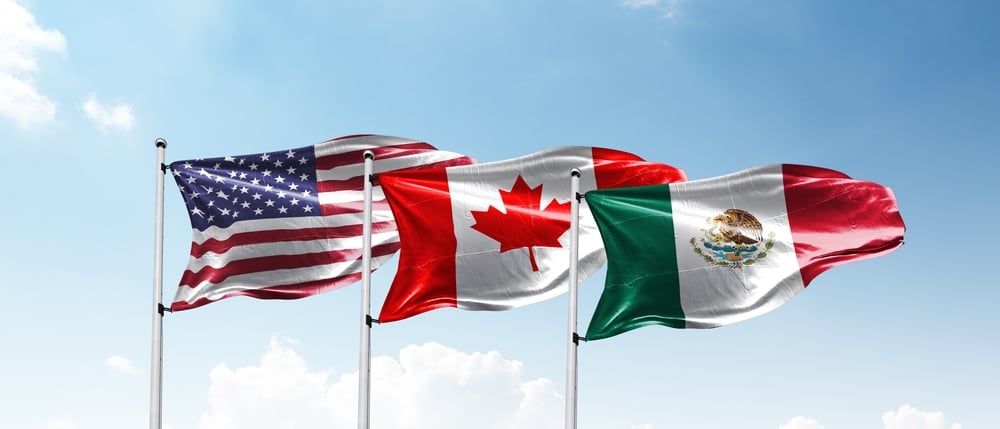There are promising signs that the U.S. may finally resolve the Mexico trucking dispute that has resulted in high retaliatory tariffs from Mexico against the U.S., and also has blocked the entry of Mexican trucks into the interior of the United States past the immediate vicinity of the border crossings.
HISTORY
NAFTA originally anticipated the opening of Mexico trucking and bus transportation throughout the member nations. This was to be implemented five years after the beginning of NAFTA in the year 2000. However, President Clinton unilaterally abrogated that provision by refusing to allow Mexican trucks to enter on the appropriate date based on alleged concerns over Mexico trucking safety. Environmental groups, including Ralph Nader's Public Citizen, also raised concerns about the effect on the environment. Lawsuits were filed and eventually, the Supreme Court decided that the Mexico trucking provisions of NAFTA did not require an Environmental Impact Statement and that there was no legal bar to the implementation. At the same time, Mexico took the United States to NAFTA arbitration and won a unanimous decision that the U.S. was obligated under NAFTA to open the borders to Mexican trucking. Under the provisions of NAFTA, if a party does not comply with an arbitration decision, the aggrieved party can retaliate by increasing duties or other actions. However, Mexico did not retaliate initially and, in fact, waited almost nine years before it published a list of 89 products that it was increasing duties on effective March 18, 2009. Mexico's patience had been worn out when the joint demonstration project, agreed to by Mexico and the U.S. to allow Mexico trucking to enter the U.S. under a pilot program, was blocked through Congressional action prohibiting the expenditure of U.S. funds to inspect these trucks, a necessary part of the program. Mexico's actions were designed to get the attention of the U.S. and it was successful in mobilizing a number of industries that were adversely affected by the duties, including U.S. exporters of pork products and other agricultural products. Of the 89 items subject to tariff increases in Mexico, 36 were agricultural products valued at approximately $864 million including wheat, beef, rice, and beans. The Administration officially supported the implementation of the Mexico trucking pilot program and the fulfillment of the U.S. obligation under NAFTA, but there was strong opposition in Congress including that of then speaker, Nancy Pelosi, along with the chairman of the key Transportation Committee in the House of Representatives. Finally, on July 8, 2011, an official notice was placed to the U.S. Federal Register announcing the establishment of a new pilot program under NAFTA for long-haul Mexico trucking. The notice by the Federal Motor Carrier Safety Administration (FMCSA) announced a January 6, 2011 agreement with Mexico to resolve the dispute by allowing Mexico-domiciled motor carriers to operate throughout the United States for up to a three-year period and reciprocal rights would be granted to U.S.-domiciled motor carriers to operate in Mexico for the same period. The Mexican-domiciled motor carriers and drivers must meet all applicable U.S. motor carrier safety standards and regulations which FMCSA would monitor and could convert the provisional authority to permanent operating authority after 18 months of successful compliance by the Mexican carriers. Mexico, in turn, agreed to lift half of its tariffs and would remove the rest, once the program is implemented. Yet, many questions still exist whether the opponents of the resolution of the Mexican trucking dispute will find additional ways to block the program in Congress as it has been done before mainly through the denial of appropriations to implement the pilot program. However, if the program is successfully implemented, it is estimated by Mexican officials that it would reduce the cost to Mexican exporters' shipping to the U.S. by about 15% by allowing direct Mexico trucking door-to-door delivery throughout the North American NAFTA zone without the need, as is currently in place, to change the tractor drivers of the truck at the borders and to use older, less efficient drayage trucks to do short hauls in the border region. Moreover, there has been indication that much of the compromising of shipments takes place during this drayage short-haul. The ability to seal trucks from point of loading to point of delivery without any intermediate changing of cabs and drivers and delays at the border, should increase cargo security and reduce existing delays and contraband issues.
Les Glick
Partner
Porter Wright Morris & Arthur, LLC
Washington, D.C.
Subscribe
Sign up and stay informed with tips, updates, and best practices for manufacturing in Mexico.





